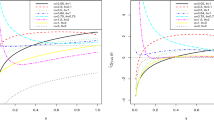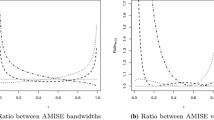Abstract
Of the many methods that have been developed for quantile regression (Wright and Royston, 1997) the LMS method (Cole and Green, 1992) can be easily understood, is flexible and based on splines. The basic idea is that, for a fixed value of the covariate, a Box-Cox transformation of the response is applied to obtain standard normality. The three parameters are chosen to maximize a penalized log-likelihood. One unpublished extension by Lopatatzidis and Green is to transform to a gamma distribution, which helps overcome a range-restriction problem in the original formulation. This paper proposes a new method based on the Yeo and Johnson (2000) transformation. It has the advantage that it allows for both positive and negative values in the response. R/S-PLUS software written by the author implementing the LMS method and variants are described and illustrated with data from a New Zealand workforce study.
Access this chapter
Tax calculation will be finalised at checkout
Purchases are for personal use only
Preview
Unable to display preview. Download preview PDF.
Similar content being viewed by others
References
Buchinsky, M. (1998). Recent advances in quantile regression models: a practical guide for empirical research, The Journal of Human Resources,33, 88–126.
Chambers, J.M. (1998). Programming with Data: A Guide to the S Language. New York: Springer-Verlag.
(eds.) Chambers, J.M. and Hastie, T.J. (1993). Statistical Models in S. Pacific Grove, CA.: Wadsworth and Brooks/Cole.
Chitty, L.S., Altman, D.G., Henderson, A. and Campbell, S. (1994). Charts of fetal size: 2, head measurements, Br. J. Obstetr., 101, 35–43.
Cole, T.J. (1988). Fitting smoothed centile curves to reference data. J. R. Statist. Soc. A, 151, 385–406.
Cole, T.J. and Green, P.J. (1992). Smoothing reference centile curves: the LMS method and penalized likelihood. Statist. Med., 11, 1305–1319.
Green, P.J. and Silverman, B.W. (1994). Nonparametric Regression and Gen-eralized Linear Models. London: Chapman & Hall.
Harris, E.K. and Boyd, J.C. (1995). Statistical Bases of Reference Values in Laboratory Medicine. New York: Dekker.
Hyndman, R.J., Bashtannyk, D.M. and Grunwald, G.K. (1996). Estimating and visualizing conditional densities. J. Comp. Graph. Statist., 5, 315–336.
Koenker, R. and Hallock, K. F. (2001). Quantile regression: an introduction. Journal of Economic Perspectives, 15(4), 143–156.
Lopatatzidis, A. and Green, P.J. (unpublished manuscript). Semiparametric quantile regression using the gamma distribution.
Rosen, O. and Cohen, A. (1996). Extreme percentile regression. In: Härdle, W. and Schimek, M.G. (eds.), Statistical Theory and Computational Aspects of Smoothing: Proceedings of the COMPSTAT ‘84 Satellite Meeting held in Semmering, Austria, 27–28 August 1994, pp. 200–214, Heidelberg: Physica-Verlag.
Smith, R.L. (1986). Extreme value theory based on the r largest annual events. J. Hydrology, 86, 27–43.
Wright, E.M. and Royston, P. (1997). A comparison of statistical methods for age-related reference intervals. J. R. Statist. Soc. A, 160, 47–69.
Yee, T.W. (1998). On an alternative solution to the vector spline problem, J. Roy. Statist. Soc. B, 60, 183–188.
Yee, T.W. and Wild, C.J. (1996). Vector generalized additive models. J. Roy. Statist. Soc. B, 58, 381–493.
Yeo, I.-K. and Johnson, R.A. (2000). A new family of power transformations to improve normality or symmetry. Biometrika,87, 954–959.
Author information
Authors and Affiliations
Editor information
Editors and Affiliations
Rights and permissions
Copyright information
© 2002 Springer-Verlag Berlin Heidelberg
About this paper
Cite this paper
Yee, T.W. (2002). An Implementation for Regression Quantile Estimation. In: Härdle, W., Rönz, B. (eds) Compstat. Physica, Heidelberg. https://doi.org/10.1007/978-3-642-57489-4_1
Download citation
DOI: https://doi.org/10.1007/978-3-642-57489-4_1
Publisher Name: Physica, Heidelberg
Print ISBN: 978-3-7908-1517-7
Online ISBN: 978-3-642-57489-4
eBook Packages: Springer Book Archive




